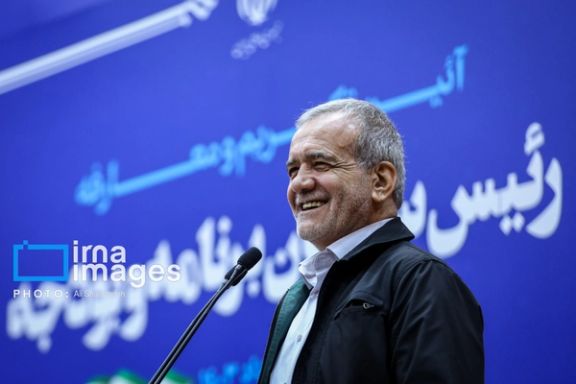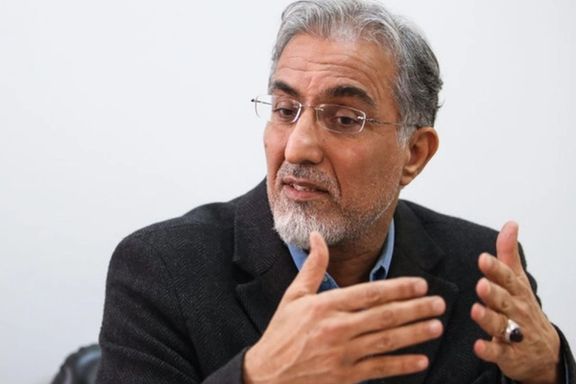Iran’s socialist economists urge Pezeshkian to purge profiteers

A prominent Iranian economist has accused President Pezeshkian's inner circle of being profiteers who have exploited undue privileges over the past 35 years.

A prominent Iranian economist has accused President Pezeshkian's inner circle of being profiteers who have exploited undue privileges over the past 35 years.
Hossein Raghfar, an economist and professor at Al-Zahra University in Tehran, referred to various lists of potential top officials in Pezeshkian's administration, claiming that a group of politicians aligned with market speculators and profiteers are poised to receive key positions.
According to Rouydad24, Raghfar was one of the four Iranian economists who met with Pezeshkian immediately after his election to warn him against the political and social consequences of the government's decisions.
Raghfar told the website that at the meeting he and three other economists, Mohammad Reza Vaez Mahdavi, Farshad Momeni of the University of Tehran, and Gholamreza Hassantash warned Pezeshkian no to follow the policies of his predecessors and instead, pay more attention to the underprivileged people.
The academic who is a member of socialist economic group known as "institutionalists," is a proreform figure close to former Prime Minister and Green Movement leader Mir Hossein Mousavi. The members of this group believe that all Iranian governments that came to power after the 1980s Iran-Iraq war were under the influence of "capitalists" and that they simply enriched themselves by "plundering people's wealth."

He told the website that the Iranian economy is overwhelmed by financial corruption. Meanwhile, he charged that some 40 percent of the market for pharmaceutical products is controlled by security agents.
According to Rouydad24, the institutionalists are based at the Institute of Religion and Economics that used to be called "The Society of God-Worshipping Socialists" in the early 1980s.
Raghfar says that all the politicians who criticize the institutionalists are the followers of liberalism and market economy. Using reverse argument, the statement defines the school of thought of Raghfar and others who gather at the Institute of Religion and Economics.
The economist says he has warned Pezeshkian that trying to introduce a single rate of exchange for the US dollar is an impossible task and doing so is likely to push the people to take to the streets. The Iranian government provides cheap dollars for the import of essential goods, which itself has become a source of corruption. However, Raghfar and his like-minded socialists advocate keeping the system in place because it supposedly makes food cheaper for low-income people.
Raghfar and his friends have published three open letters to Pezeshkian in less than six weeks. In their third letter, they complained that the new president has not responded to their previous correspondence, adding that the new government does not seem to have any economic plan or any solution for the country's economic problems.
Speaking about the group's plan about the country's economy. Raghfar said: "Based on our calculations we can supply the essential needs of the population with $35 billion. We do not need to allocate foreign currency to the production of tomato paste or carpets. Previous governments have authorized the activity of 160 motorcycle manufacturing factories that consume foreign exchange but do not produce any added value. During the war in the 80s Iran had $7 billion revenue in foreign exchange. We spent $3 billion on the people's essential needs and $4 billion on the war and the society could function properly."
He added: "Today, decision makers have their own interests rather than protecting the people's rights. For years we have been giving billions of dollars to import oil seeds and no one asked why we do not produce this. "
However, Raghfar failed to mention that Iran’s total annual oil revenues is $35 billion and if it is all spent to provide daily necessities, there will be nothing left for investments.
Raghfar added: "What we call financial corruption is in fact plundering of the people's wealth. Controlling corruption is not an economic matter. The government is responsible for stopping it."
Meanwhile, Farshad Momeni, another institutionalist economist has warned the president that "If Pezeshkian continues to behave in the same way he has done so far, his government will end up with the same fate as the Raisi administration. Mr. Pezeshkian must make a strategic choice. Either he wants to make the economic intermediaries and profiteers fatter, or he should prioritize the housing, nutrition, education and health of the poor people."